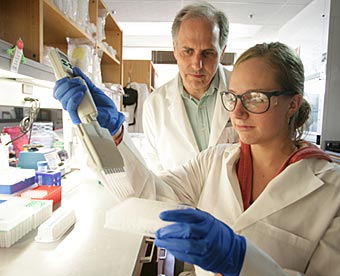
Researchers at Vanderbilt University Medical Center, and across the globe, announced today a multi-national collaboration to discover and map all genes relating to Alzheimer’s disease through the formation of the International Genomics of Alzheimer’s Project (IGAP).
Alzheimer’s disease, a progressive, neurodegenerative disorder that is fatal, has no cure and available drugs only marginally affect disease severity.
“This is a fantastic opportunity for Vanderbilt to participate in a worldwide effort to understand the mysteries of Alzheimer’s disease,” said Jonathan Haines, director, Vanderbilt Center for Human Genetics Research. “By joining together with experts around the world, we will more quickly and completely unravel the genetic causes of this problem.”
The collaborative effort will combine the knowledge, staff and resources of four consortia that work on Alzheimer’s disease genetics –
- Alzheimer’s Disease Genetics Consortium (ADGC) from the United States
- European Alzheimer’s Disease Initiative (EADI) in France
- Genetic and Environmental Risk in Alzheimer’s Disease (GERAD) from the United Kingdom
- Neurology subgroup of the Cohorts for Heart and Aging in Genomic Epidemiology (CHARGE)
The Alzheimer’s Association estimates that there are more than 5.3 million people in the United States with Alzheimer’s disease. Alzheimer’s Disease International estimates there are 35.6 million people living with dementia worldwide, increasing to 65.7 million by 2030, and 115.4 million by 2050. Total estimated worldwide costs of dementia were $604 billion in 2010.
“The skyrocketing prevalence and cost of Alzheimer’s disease and related dementias will soon undermine the delivery of health care worldwide,” said ADGC leader Gerard Schellenberg, University of Pennsylvania School of Medicine. “That gives innovative collaborations like this new international genomics project added incentive to act quickly and boldly to make new discoveries.”
Watch video about Haines’ research on Alzheimer’s genetics.
Formation of the IGAP, which is supported by the Alzheimer’s Association and the Fondation Plan Alzheimer, creates a shared resource database that includes genetic data for more than 40,000 individuals.
IGAP investigators will initially compare the genetic data of more than 20,000 Alzheimer’s patients with about 20,000 healthy elderly subjects. As the study progresses, 10,000 additional people with Alzheimer’s and the same number of healthy elderly subjects will be added to the study.
The ADGC is supported by the National Institute on Aging/National Institutes of Health (NIH); EADI is supported by the Fondation Plan Alzheimer, the Institut Pasteur de Lille and Inserm; GERAD is supported by the Medical Research Council (UK); CHARGE is supported by the NIH, Erasmus University and others.
Learn more about Alzheimer’s disease.